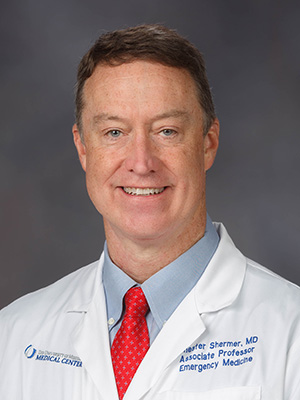A Note from Dr. Chet Shermer

Dr. Shermer is a Professor in Emergency Medicine and is the Department's Medical Director for Tel-Emergency.
One of the biggest clinical challenges we've faced recently was the abrupt closure of the JMS Burn & Reconstructive Center at Merit Health Central, the state’s only burn center. This resource has been crucial to the care of our adult and pediatric burn patients, as well as hand injuries requiring microsurgical reconstruction. To fill the void, Dr. Alan Jones, Associate Vice Chancellor for Clinical Affairs, announced that UMMC will accept and treat burn patients that do not meet formal burn center guidelines. MCES staff identified regional resources for burn centers and have provided rapid transport for critically burned patients.
Although COVID-19 has receded somewhat over the last six months, we are not immune from other emerging diseases. While ebola has been known about for years, another outbreak in Africa prompted the creation of a field hospital for isolation by MCES and emergency medicine administration. Once again, UMMC has proactively prepared for potential health threats that may come to our state. Before this threat appeared, we also came to face to face with a previously unthreatening virus in the form of an orthopoxvirus known as monkeypox. To date, there have been almost 80,000 confirmed infections worldwide.
We have continued to see increased use of our layered consultative services within the TelEmergency Program. Dr. Sarah Sterling and Mr. Simon Barinas, along with stakeholders in Psychiatry, Toxicology and Neurology, have developed and championed the consultative services that UMMC offers to our TelEmergency sites throughout the state. We offer Psychiatry services to adults and children Monday through Friday, while Neurology and Toxicology are available for consults every day.
For the remainder of the year, the hospitalist group is piloting a QI project for our patients with sickle cell pain crisis. Starting October 24th, all patients with sickle cell disease will be admitted to the hospitalist group for the rest of the calendar year. Other collaboration projects include preparation for the upcoming Comprehensive Stroke Center survey team evaluation, and improving the process for accepting aortic dissection patients.
In closing, 2022 has been an interesting year. We continue to battle disease daily while dealing with difficult, nationwide issues like boarding and staffing shortages. Thanks to the hard work of our entire ED team, we are formidable and up to the task! Happy holiday season and best wishes for a healthy 2023.


